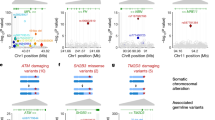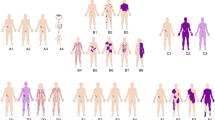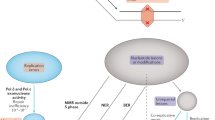Abstract
Evidence that recessive cellular alleles at specific chromosomal loci are involved in tumorigenesis has been recently shown by work on tissues from patients with retinoblastoma, a neoplasm of embryonic retina whose predisposition is inherited as an autosomal dominant trait1. A comparison of germ-line and tumour genotypes at loci on human chromosome 13, defined by restriction fragment length polymorphisms, showed that loss of the chromosome bearing the wild-type allele at the Rb-1 locus occurred frequently in the development of retinoblastoma. We report here results of similar studies of another embryonal neoplasm, Wilms' tumour of the kidney. Examination of germ-line and tumour genotypes from seven patients showed that five cases were consistent with the presence on human chromosome 11 of a locus in which recessive mutational events are expressed after abnormal chromosomal segregation events during mitosis.
This is a preview of subscription content, access via your institution
Access options
Subscribe to this journal
Receive 51 print issues and online access
$199.00 per year
only $3.90 per issue
Buy this article
- Purchase on Springer Link
- Instant access to full article PDF
Prices may be subject to local taxes which are calculated during checkout
Similar content being viewed by others
References
Cavenee, W. K. et al. Nature 305, 779–784 (1983).
Knudson, A. G. & Strong, L. C. J. natn. Cancer Inst. 48, 313–324 (1972).
Riccardi, V. M. et al. Pediatrics 61, 604–610 (1978).
Francke, U. & Riccardi, V. M. Cytogenet. Cell Genet. 24, 185–192 (1979).
Riccardi, V. M. et al. Cancer Genet. Cytogenet. 2, 131–137 (1980).
Slater, R. M. & Kraker, J. Cancer Genet. Cytogenet. 5, 237–245 (1982).
Yunis, J. J. & Ramsay, N. K. C. J. Pediat. 96, 1027–1030 (1980).
Gerald, P. S. & Grezeschik, K. H. Rep. Comm. Genetic Constitution of Chromosomes 10, 11 and 12 (Int. Congr. Hum. Gene Mapping VII, Los Angeles, 1983).
Barker, D. F. & White, R. L. Am. J. hum. Genet. (in the press).
Bell, G.I., Karam, J. & Rutter, W. J. Proc. natn. Acad. Sci. U.S.A. 78, 5759–5763 (1981).
Bell, G.I., Selby, M. J. & Rutter, W. J. Nature 295, 31–34 (1982).
Antonarakis, S. E. et al. Proc. natn. Acad. Sci. U.S.A. 79, 137–141 (1982).
Goldfarb, M. et al. Nature 296, 404–409 (1982).
Huerre, C. et al. Nature 305, 638–641 (1983).
de Martinville, B. & Francke, U. Nature 305, 641–643 (1983).
Author information
Authors and Affiliations
Rights and permissions
About this article
Cite this article
Koufos, A., Hansen, M., Lampkin, B. et al. Loss of alleles at loci on human chromosome 11 during genesis of Wilms' tumour. Nature 309, 170–172 (1984). https://doi.org/10.1038/309170a0
Received:
Accepted:
Issue Date:
DOI: https://doi.org/10.1038/309170a0
This article is cited by
-
Wilms-Tumor
Der Urologe (2006)
-
Dissociation of p53-mediated suppression of homologous recombination from G1/S cell cycle checkpoint control
Oncogene (2000)
-
Surgical tactics in the treatment of malignant renal tumors in childhood
Pediatric Surgery International (1997)
-
Hereditary cancer: Two hits revisited
Journal of Cancer Research and Clinical Oncology (1996)
Comments
By submitting a comment you agree to abide by our Terms and Community Guidelines. If you find something abusive or that does not comply with our terms or guidelines please flag it as inappropriate.



